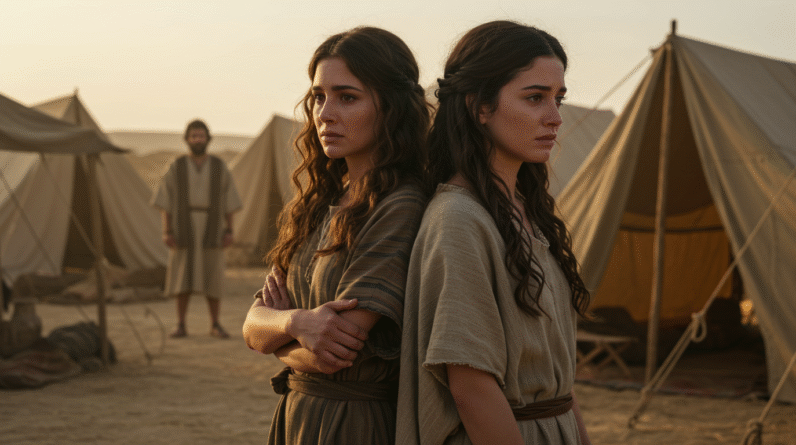Explore the journey of Sarah from barrenness to motherhood in Genesis, a story of faith, doubt, and divine timing. Discover fresh insights into age-old promises.
Sarah’s Journey from Barrenness to Motherhood: A Fresh Perspective on Genesis
In the world of stories that carry timeless significance, few narratives touch us as deeply as the biblical account of Sarah’s journey from barrenness to motherhood. This story is more than just ancient text; it speaks to the heart about patience, faith, and the ultimate fulfillment of promises. What does it mean for you today? Let’s dive into this tale with fresh eyes and uncover insights that might have been overlooked in this longstanding narrative.
mean for you today? Let’s dive into this tale with fresh eyes and uncover insights that might have been overlooked in this longstanding narrative.
📖 Key Verse: Genesis 21:1-2
“The Lord kept his word and did for Sarah exactly what he had promised. She became pregnant, and she gave birth to a son for Abraham in his old age. This happened at just the time God had said it would.”
The Premise of Sarah’s Story
Sarah’s journey is, first and foremost,t a story of promise. In the book of Genesis, we meet her as the wife of Abram, later known as Abraham. For many years, Sarah dealt with the cultural stigma of being barren—a significant issue in an era where a woman’s worth was often tied to her ability to bear children. Despite her husband’s devotion and God’s promise of a son, the years passed without the promise being fulfilled.
This is where you are invited to draw parallels. How many times have you been in a situation where the fulfillment of a promise seemed delayed beyond hope? Perhaps you’ve even given up, seeing your situation as irredeemable. However, as we explore Sarah’s story, you’ll learn that the timing is often not ours to dictate.
Great Expectations: Hope Deferred
Anticipation and Doubt: A Relatable Conflict
Imagine the internal conflict Sarah must have dealt with. She was promised something immense—a nation that would stem from her lineage, yet her womb remained empty. Living in that age, her barrenness must have felt like a public branding of inadequacy. It’s a situation that resonates with anyone who has ever felt overlooked or unfulfilled.
In Genesis 16, Sarah’s impatience and doubt ultimately lead her to offer her maidservant Hagar to Abraham to bear a child. By trying to manipulate her circumstances to fit her expectations, Sarah tries to circumvent the natural order of the promise given to her. In our lives, how often do we try to force outcomes, unwilling to wait for promises to unfold naturally?
Lessons from the Expectant Waiting
In the context of our modern lives, waiting can be a painstaking process. We’re conditioned for instant results, whether it’s in career, relationships, or personal goals. However, Sarah’s life teaches us that sometimes the wait itself is a crucial part of achieving the promise. Despite her momentary lapse, the eventual birth of Isaac reminds us that waiting doesn’t mean absence; instead, it might mean preparation.

The Intersection of Faith and Doubt
The Moment of Laughter
One of the most gripping moments in Sarah’s story is her reaction to overhearing divine messengers affirming God’s promise of a son Genesis 18:10-12. The thought of bearing a child at her age caused her to laugh silently. Why wouldn’t she? At nearly 90, the notion defied all logic.
Sarah’s laughter, a cynical yet profoundly human reaction, paves the way for an important conversation: the dance between faith and doubt. You’ve likely experienced similar moments—those when enduring hope seem almost naive. What do you do then? Sarah’s story suggests that even doubts can exist alongside faith, and both can be part of a larger tapestry designed to fulfill greater purposes.
Vulnerability and Transformation
Sarah’s spiritual journey doesn’t end with doubting laughter. Vulnerability opens a door to transformation. Once skeptical and weary, she eventually becomes a testament to the transformative power of faith. The divine did not hold her initial disbelief against her but instead transformed it with the miracle of Isaac’s birth.
Realization of Promise: The Birth of Isaac
When the Impossible Becomes Possible
The fulfillment of God’s promise in Isaac’s birth (Genesis 21:2) offers an incredibly optimistic message. While humans may deem something impossible, the narrative reminds you that divine plans operate beyond finite understanding. Whenever you doubt the fruition of a dream or vision that seems unattainable, remember Sarah. What seems improbable doesn’t dictate the possibilities of your future.
A Dual Legacy: Faith and Family
Isaac’s birth did much more than just give Sarah the joy of motherhood; it solidified her role in a legacy of faith. As a matriarch, Sarah becomes linked with generations that follow, not just as a physical ancestor, but as a figure of courage and faith that overcame adversities. How does your life’s story impact those around you, and what kind of legacy are you crafting for future generations?
Conclusion: From Barrenness to Abundance
Sarah’s journey from barrenness to motherhood reflects a universal truth: the transformation from emptiness to fulfillment often involves a struggle with doubts, impatience, and spiritual tests. Her story isn’t just tied to ancient text but is alive in the situations you face today. By embracing Sarah’s narrative, there’s a realization that the path to promises fulfilled can indeed be as vital as the destination itself.
Reflect and Act
As you consider Sarah’s story, take time to reflect on areas where you need to let go, trust the timing, and allow for the unfolding of greater plans. What promises are you waiting for, and how can Sarah’s journey guide you in your process of faith and patience?
If this narrative resonated with you, perhaps it’s time to share it with someone else or explore more biblical stories that touch our modern lives. Remember, your journey is never solitary, and there are lessons etched in ancient stories that still speak truths into our daily struggles.

🔍 Explore More Bible Insights:
✅ 1. The Role of Eliab – David’s Brother in His Journey to Facing Goliath
Tone: Relational, reflective, character-focused
🔹 “Family Tensions and God’s Purpose – Discover the Connection”
Read it here.»
✅ 2. What Jeremiah 29:11 Means for Us Today
Tone: Hopeful, encouraging, life application
🔹 “God’s Plans Still Stand – Find Your Hope Here”
Read it here.»
✅ 3. The Wise and Foolish Builders – A Strong Foundation in Faith (Matthew 7:24-27)
Tone: Foundational, practical, discipleship
🔹 “Build Your Life on the Rock – Keep Learning”
Read it here.»
✅ 4. The Roman Centurion at the Cross – A Moment of Revelation
Tone: Awe-inspiring, redemptive, gospel-centered
🔹 “From Witness to Believer – Read His Revelation”
Read it here.»
As a ClickBank Affiliate, I earn from qualifying purchases.
Acknowledgment: All Bible verses referenced in this article were accessed via Bible Gateway (or Bible Hub).
“Want to explore more? Check out our latest post on Why Jesus? and discover the life-changing truth of the Gospel!”








